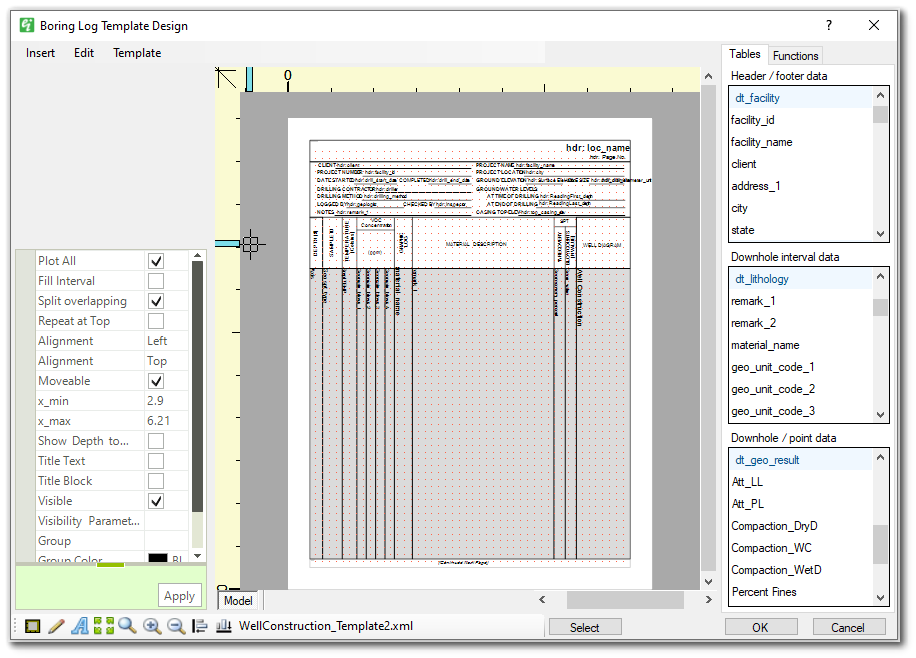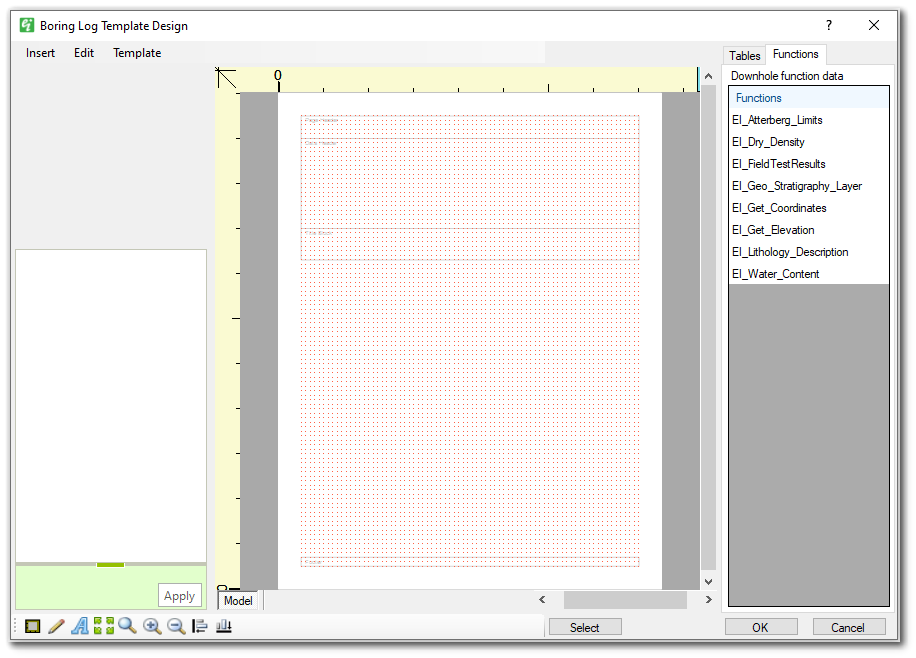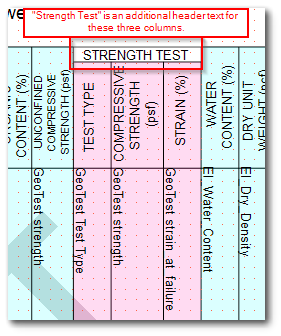•Downhole Groups and Visibility
The Boring Log Template Design window enables the user to create new boring log templates or modify existing templates. To access the Boring Log Template Design window:
1.Open the Tasks Pane on the right-hand side of the EnviroInsite interface
2.Select Create Window and then select Boring Logs. A new view window is generated.
3.Select Plot> Logs or Logs from Template and the Select Borings dialog box opens.
4.Highlight the desired boring locations and click the => button to move the boring locations to the Selected pane.
5.Click OK. The Boring Log Template Design window will open.

The Tables tab on the Boring Log Template Design window is used to select the data fields to be plotted and to design the layout of the page. The fields are selected from the lists at the right of the window. Each of the lists are derived from a different table or field set. The table names highlighted in blue serve as section dividers and may not be added to a template design.
For EQuIS users, the source tables and fields are described in the Tables and Fields used in Generating Full-Page Boring Logs article.
For non-EQuIS users, the source data for each type of interval is as follows:
Header / Footer Data |
Fields of Wells Table |
Downhole Interval Data |
Fields of Borings Table |
Downhole / Point Data |
Contents of Constituents Field in Point Values Table |
Fields are added to the Boring Log Template Design window by double-clicking on the field name or by selecting a field and dragging and releasing it at the desired location on the template. Once placed on the Boring Log Template Design window, fields may be dragged using the mouse to the desired location.
Where present (e.g., Header/Footer Data | dt_drill_activity | Select drill_event), drop-down menus enable filtering data sources by selected values in the database (all facilities). To use this feature, select the drop-down menu and choose the desired value and then add related fields to the template. The field placeholder names that are added to the layout are prepended with the filter value (e.g., "hdr: INITIAL_drill_start_date" for the start_date of INITIAL drill event). Change the filter selection, then add related fields to the template again as desired. This enables including multiple records of the same field related to different events (e.g., data from multiple drill events may be grouped and displayed together). If no option is selected from the drop-down, the template will use a default record.
Multiple objects may be selected in the template by holding the SHIFT key and clicking the desired objects. The grouped objects may be moved around the template by again holding the SHIFT key, then clicking and dragging the group.
Selected objects may also be aligned with right-click> Align> Left or Bottom. The objects are aligned based on the placement of the blue object box that is displayed when an object is selected. The placement of the blue object box may be changed in the Alignment section of the Properties window.
When an object is selected in the Boring Log Template Design window, that object's properties are populated in the Properties window in the bottom-left corner. Double-clicking on a placed object in the Boring Log Template Design window opens a pop-up context-sensitive Properties window. The object properties can be modified in either the Properties window or the pop-up Properties window. Data fields added to the main body of the template will generate an associated title block for the data. This block and its text may be toggled off in the properties menu of the data object.
Downhole data may be plotted as boring log columns using EQuIS SQL functions if appropriately configured. See the Tables and Fields to Generate Full Page EnviroInsite Boring Logs article for configuration details.
Note: If the column_header is populated in the SQL function and there is no data for that column in the boring log, then that column_header will not display. The user must create a Title Text of the column in their boring log template to avoid this problem. |
|---|

Downhole Groups and Visibility
In the properties of a Downhole Interval Data or Downhole / Point Data object, the visibility of an object may be turned off for the plotted boring logs without the need to remove the object from the template completely. Groups and group colors may also be assigned to organize data objects. If an object within a group has its visibility unchecked, any remaining contiguous group members will resize automatically to fill the space of the disabled object. Title blocks for each data object will similarly resize to stay in line with the data fields. If a group is unassigned, its group color will reset to black.
When a visibility parameter is assigned to a column on the boring log and that column has an additional text/line associated with it, then the user must assign a group to this column so that the additional text/line is removed when the visibility for the column is turned off. For example, in the image below "Strength Test" is a header associated with three columns (Test Type, Compressive Strength, and Strain). These three columns are assigned a visibility parameter and are grouped together (shown in pink). When the visibility parameter is turned off for these three columns, then the "Strength Test" header is also removed.

Visibility settings for Downhole Interval Data and Downhole / Point Data objects may be overridden using the PARAM_CODEs in the DT_TASK_PARAMETER and DT_FACILITY_PARAMETER tables. Visibility settings in DT_TASK_PARAMETER will take precedence over visibility settings in DT_FACILITY_PARAMETER if the PARAM_CODEs are identical. To use these PARAM_CODEs as EnviroInsite visiblity settings, follow these requirements:
DT_TASK_PARAMETER
•The PARAM_CODE must first exist in RT_TASK_PARAM_TYPE.PARAM_CODE with STATUS_FLAG = 'A'.
•RT_TASK_PARAM_TYPE_CONTEXT = 'EI_Visible_Parameter'
DT_FACILITY_PARAMETER
•The PARAM_CODEs must first exist in RT_FACILITY_PARAM_TYPE with STATUS_FLAG=A.
•The PARAM_CODE must begin with “EI_", followed by text of your choosing. [The naming convention of “EI_{DATA NAME}_VISIBLE (from Builds prior to 7.21.2 ) is no longer required].
Assign “N”/“NO” as the TASK_CODE PARAM_VALUE to disable an assigned column, or “Y”/”YES” to enable disabled object to be visible.
Note: Apart from the field not displaying in the boring log, there is no visual indicator within EnviroInsite that this override designation has been set in the DT_FACILITY_PARAMETER table. PARAM_CODEs may be assigned to Downhole Interval Data and Downhole / Point Data objects in their properties under the “Visibility Parameter” drop-down. |
Downhole field box widths may be resized by selecting the box and dragging the corner sizing rectangles.
A control bar at the bottom of the page enables users to zoom to the window extent, zoom to a window, or pan within the page. Images, lines, text, and rectangles may be added to a log report by selecting the appropriate button on the control bar at the bottom of the page.
When the boring log report design is complete, save the design to a template by selecting Template> Save or click OK to draw the boring log for the selected locations. Clicking the Select button opens a window to allow selection of locations. If no locations are selected, then all locations will be plotted.